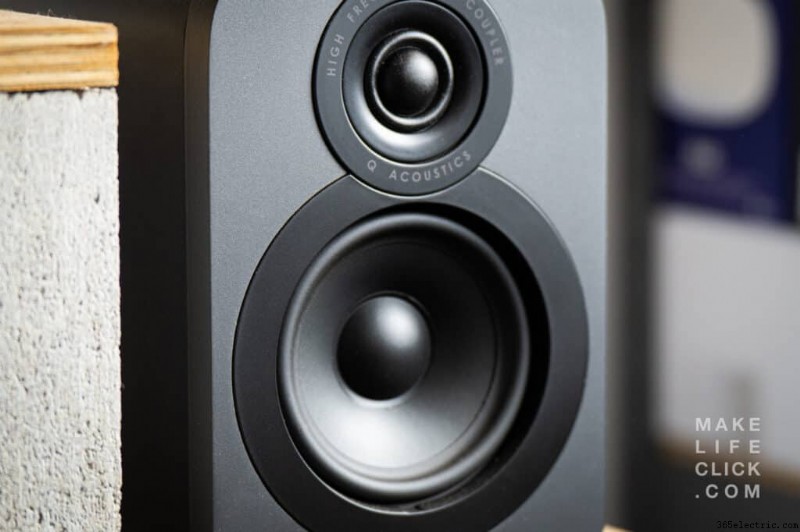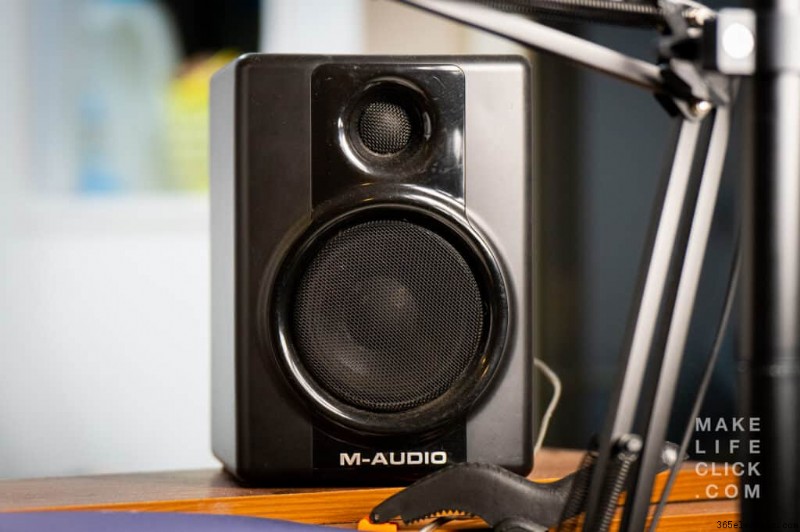¿Qué equipo de alta fidelidad es más preciso:auriculares o altavoces?
Los auriculares han llevado la accesibilidad a un nivel completamente nuevo, de eso no hay duda.
Combine la libertad y la privacidad que ofrecen los auriculares con la calidad de sonido de alta fidelidad y tendrá un ganador.
Pero, ¿significa esto que los auriculares siempre son más precisos que los altavoces?
La respuesta no es tan simple como sí o no.
Antes de sumergirme profundamente en el mundo de la audiofilia, también creía que los sistemas de parlantes simplemente no podían vencer a un auricular de buena calidad.
Sin embargo, luego probé los altavoces de alta fidelidad por primera vez (viendo El señor de los anillos ). Y ese fue el día en que mi percepción cambió.
Claro, los auriculares pueden acercarte bastante al sonido que los artistas y productores pretendían que escucharas, la imagen estéreo puede ser realmente sublime.
Pero hay algo acerca de los parlantes que crean una experiencia más realista y real.
No me refiero solo a los subwoofers que crean graves estremecedores:¡es todo el paisaje sonoro, desde los agudos hasta los medios y todo lo demás!
En mi opinión, la calidad envolvente de los altavoces también es muy superior.
Es difícil de explicar, pero cuando los comparas uno al lado del otro, es obvio que los parlantes crean un sonido más natural. Y esto es especialmente cierto para la música clásica y acústica.
Si quiere sentirse como si estuviera en la misma habitación que la orquesta, escuchando cada pequeño detalle y eco, entonces los parlantes son definitivamente el camino a seguir.
Sin embargo, en el debate entre auriculares y altavoces, todo se reduce a preferencias personales, pero hay otro elemento muy importante a considerar; precisión del sonido.
Aquí, exploraré las diferentes formas en que los auriculares y los parlantes pueden afectar la precisión del sonido, para ayudarlo a tomar una decisión más informada.
Pros de los auriculares:
- Aíslan completamente al oyente del entorno.
- Proporcionan sonidos muy precisos porque no permiten que ningún ruido externo interfiera con lo que estás escuchando.
- Son muy portátiles y se pueden llevar a cualquier parte.
- Son relativamente más baratos que los altavoces.
- Puedes usarlos en cualquier momento sin molestar a los demás.
Desventajas de los auriculares:
- Pueden causar daños a largo plazo en los oídos si los usa durante largos períodos de tiempo a un volumen alto.
- Pueden ser muy incómodos (audífonos más que audífonos, pero supongo que todos estarán de acuerdo en que los audífonos ofrecen una calidad mucho mejor que los audífonos, ¿no?), especialmente si tiene que usarlos durante largos períodos de tiempo.
- Si los auriculares no son de buena calidad, ni siquiera se compararán con los altavoces normales, y mucho menos con los altavoces de alta fidelidad.
- No son tan robustos ni duraderos como los altavoces.
Pros de los altavoces:
- Proporcionan un sonido más realista y natural que los auriculares, teniendo en cuenta el entorno.
- Es menos probable que dañen sus oídos porque la fuente de sonido está más lejos de sus oídos. Sin embargo, tienen la capacidad de ser más ruidosos que los auriculares, lo que puede tener impactos adversos si escuchas música alta durante períodos más largos (bajistas y fanáticos del metal, ya sabes de lo que estoy hablando).
- Puedes compartir tu música con otras personas fácilmente.
- Por lo general, son más duraderos que los auriculares.
- Por lo general, son más personalizables y ofrecen un paisaje sonoro más preciso que los auriculares.
Desventajas de los altavoces:
- They are not as portable as headphones and can be quite bulky.
- You need a lot of space to set them up.
- They can be very expensive, especially if you want a high-end setup.
- They might not provide accurate sound if they are damaged, and unlike headphones, you won’t know of the damage right away.
So, which one is more accurate? There are several considerations to make before you make a decision, and the first is the definition of sound accuracy.
What is Sound Accuracy?
Sound accuracy is the ability of a piece of audio equipment to reproduce sound without any distortion. The higher the sound accuracy, the closer the reproduced sound will be to the original sound.
There are two main types of distortion – harmonic and intermodulation.
Harmonic distortion occurs when the waveform of the reproduced sound is different from the waveform of the original sound.
Intermodulation distortion , on the other hand, occurs when two or more frequencies mix together to create new frequencies that were not present in the original sound.
The mixture of these waves can also increase or decrease the volume of your music, depending on whether the wave interference is destructive or constructive.
Harmonic distortion is usually more noticeable than intermodulation distortion, as it can make the reproduced sound “muddy” or “blurry”.
However, both types of distortion can impact the sound quality and make it less accurate.
Less accurate sound in high fidelity terms means that you won’t be able to identify different instruments and effects introduced into the sound and may miss out on the true depth of the music.
Headphones vs Speakers:Which is More Accurate?
There are several factors to consider when deciding which type of equipment is more accurate – headphones or speakers.
- The type of distortion: As I discussed earlier, harmonic distortion is more noticeable than intermodulation distortion. Therefore, if you are looking for sound accuracy, you should look for headphones or speakers that have low levels of harmonic distortion.
- The frequency response: The frequency response is the range of frequencies that a piece of audio equipment can reproduce. The wider the frequency response, the more accurate the reproduced sound will be.
- Power handling: Power handling is the amount of power that a piece of audio equipment can handle without distorting the sound. The lower the power handling, the more distortions and issues you will need to deal with in your hi-fi equipment.
- The sensitivity: The sensitivity is the amount of sound that a piece of audio equipment can produce with a given amount of power. The more sensitive your hi-fi equipment is, the more prominent the distortions will be, but it will also mean that you will hear every single detail of your music. The best way to ensure higher sensitivity and lower noise are to go for speakers or headphones that have a higher impedance/resistance reading.
- Volume: People tend to increase the volume on headphones by 20% to 50% headphones than on speakers. This can cause the sound to become distorted, which will reduce sound accuracy. However, the same sound level on speakers can also produce distortion if the speakers are not of good quality. Furthermore, the distance between you and the speakers can introduce other sounds as well, which can reduce accuracy.

The Major Consideration:Your Goal
While all of the above elements do have a prevalent impact on your music’s accuracy and quality, it is important to note that which equipment to use will be impacted severely by what your goal is.
If you are looking for sound accuracy for professional use, such as in a studio, then speakers are the way to go.
This is because they provide the widest frequency response and the lowest levels of distortion.
They most often have a near field design, meaning they can be close to you and still throw the sound with decent imaging and a full sound stage.

However, if you are looking for sound accuracy for personal use, such as listening to music at home, then headphones are the way to go. This is because they provide a more intimate listening experience and you can control the sound level more easily to avoid distortion.
No matter what your goal is, it is important to consider all of the above factors before making a decision. Different people have different preferences, so what might be the best for one person might not be the best for another. The most important thing is to find what works best for you.
My Personal Opinion
Personally, I am a fan of hi-fi speaker systems. I like the idea of being able to hear all the different instruments and sounds in a song, and I think that speakers provide the best opportunity to do that.
I also appreciate being able to control the sound level and create a custom listening experience.
Furthermore, high-fidelity speakers that offer surround capabilities have proven to create a much better “vibe” for me than headphones have.
I feel more engaged with my music, and the experience is just more enjoyable for me.
That is not to say that I dislike or don’t use hi-fi headphones, though.
During composition and mixing, I usually wear headphones and have several dedicated pairs for different occasions.
Using both types of hi-fi equipment, I understand that not everyone has their own preference – and the debate between headphones and speaker systems is one for the ages.
Some people prefer to have a more personal listening experience with headphones, and that’s perfectly fine. There is no right or wrong answer – it really depends on your preferences.
¿Cuál prefieres?
Let me know down in the comment section to continue the discussion!
- ·Cómo entender y Conectar los equipos de sonido
- ·Surround Sound Alternativas
- ·Cómo instalar equipos y altavoces de audio
- ·¿Qué es un sistema de sonido 6.1
- ·Información sobre la instalación de sonido envolvente
- ·Cómo probar mis altavoces 5.1
- ·Definición de sistema de sonido envolvente
- ·Cómo limpiar Equipos de Sonido
